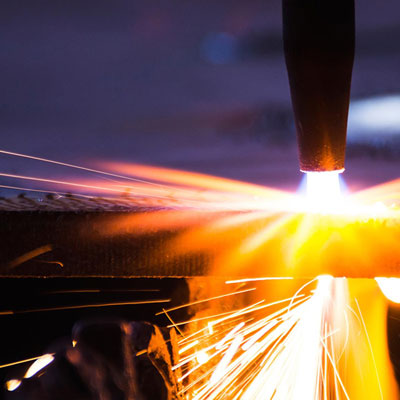This is a self-funded PhD position to work with Dr Adnan Syed in the Surface Engineering and Precision Centre. The PhD project will focus studying high temperature corrosion mechanisms in details to identify the material degradation and coatings applications details in extreme environments. A novel techniques/method will be developed with focus on better prediction and more accurate measurement of high temperature corrosion rate involving mathematical models validated through simulation, experiments and analysis.
Post COP26, the UK has also set a target to cut emissions of greenhouse gases to net zero by 2050. The power generation sector considers agricultural waste as a renewable energy source which can help offsetting coal combustion. Such Waste to Energy (WtE) plants produce flue gases that can have much higher levels of SOX and HCl than coal fired systems, and this can cause increased high temperature corrosion (HTC) damage to surfaces of heat-exchanger (HX) materials. Coating of HX materials in power plant boilers is widely used to mitigate HTC. Multiple routes for coating chemistry and application processes are being considered. A novel approach of multi-layered advanced material coatings system will be studied in this project .The lack of ability of early detection and timely prevention of high temperature corrosion has resulted in many HX failures leading to long term maintenance and replacement of parts.
The alloy material of HX are prone to high temperature corrosion attack because of the corrosive nature of molten salt deposits and gases. The salt deposits and its direct contact with alloys material at elevated temperatures. cause high-temperature corrosion.
You will investigate various alloys types and corrosion testing methods to determine a suitable alloy and coating system The project includes a detailed literature survey leads to the development of a test matrix, includes test conditions, type of alloys used including bare or coated alloys. The project includes testing the material in the facility available at Cranfield’s high temperature corrosion laboratory. A detailed analytical phase. for better understanding of the microstructure, requires working on the advanced microscopy tools such as SEM/EDX, FIB and TEM. Also use dimensional metrology for metal loss evaluation. Thermodynamics calculations using FactSage software will also be used. Also, a consideration of applying electrochemical characterisation techniques using online electrochemistry and interpret corrosion rates.
You will be based at the Surface Engineering and Manufacturing Centre, which provides state-of-the-art equipment for the testing, analysis and characterisation of materials, of exposed corroded materials. This is a self-funded PhD open to UK, EU and international applicants.
The Centre also holds network with the aerospace and energy sector which help the you in the result discussions, a possibility of meetings with relevant industrial clients for networking and technical guidance.
Research carried out during this PhD project will lead to better understanding of Fireside corrosion that will eventually:
- Enable early failure identification.
- Enable material selection criteria for alloys and coatings systems.
- Increase alloys and coating material knowledge of performance in extreme environments.
- Improve HX material outcome. Although the research proposed here will focus on HX, by changing the testing conditions, the technology developed here could be easily adapted for aerospace and other power generation applications.
You will work in a multidisciplinary environment consisting of material scientist, chemists, engineers, physicists, material scientists. During the PhD, the candidate will gain the invaluable experience of working at the intersection of several research fields with the challenges and opportunities that this represents. On addition, this self-funded PhD project includes the ability to participate in industry-led research initiatives and access to the Cranfield Doctoral Training Network.
You will gain knowledge of high temperature materials application for energy and aerospace sector. The knowledge of alloys material behaviour in aggressive conditions and its serviceability for the relevant sector. The micro level analysis of the material structure would enable the students to understand science better at atomic level. The student will learn the skills of presenting the results to small and large groups of people via presentations in conferences and meetings.
At the end of the PhD, you will have become a well-rounded independent scientist with the possibility to progress your career either in academia or industry in several research areas from material science and engineering to energy and aerospace alloys materials.
At a glance
- Application deadlineOngoing
- Award type(s)PhD
- Duration of award3 years
- EligibilityUK, EU, Rest of world
Entry requirements
Candidates should have a minimum of an upper second (2:1) honours degree (or equivalent) preferably in one of the following disciplines: Chemistry/ Material Science/ Physics/ Mechanical engineering or related fields. Candidates with a MSc degree in these disciplines will be desirable.
Cranfield Doctoral Network
Research students at Cranfield benefit from being part of a dynamic, focused and professional study environment and all become valued members of the Cranfield Doctoral Network. This network brings together both research students and staff, providing a platform for our researchers to share ideas and collaborate in a multi-disciplinary environment. It aims to encourage an effective and vibrant research culture, founded upon the diversity of activities and knowledge. A tailored programme of seminars and events, alongside our Doctoral Researchers Core Development programme (transferable skills training), provide those studying a research degree with a wealth of social and networking opportunities.
How to apply
For further information please contact:
Name: Dr Adnan Syed
Email: adnan.syed@cranfield.ac.uk
If you are eligible to apply for this research studentship, please complete the online application form.




